UN Rights Council President Supports Fact-Finding Mission On Iran
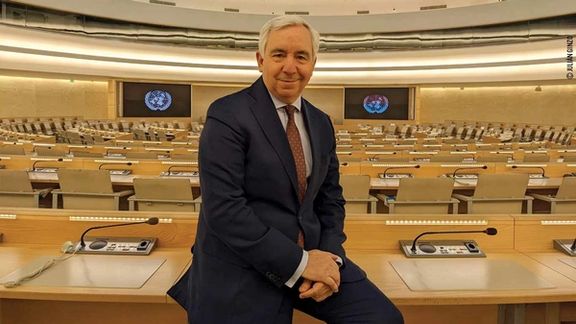
The UN Human Rights Council president says he believes that the newly established fact-finding mission on Iran can make a difference.

The UN Human Rights Council president says he believes that the newly established fact-finding mission on Iran can make a difference.
In an interview with CNN International, Federico Villegas of Argentina said Friday that the newly created fact-finding mission to investigate alleged human rights violations in Iran “can make a difference,” and expressed hope that Iran will cooperate.
During the special session on Iran Thursday, the President of the Human Rights Council had noted that it is a multilateral and democratic body where differences of opinion are legitimate, raising hope that the Islamic Republic would cooperate to carry out the mission.
“I think that at one moment or another they will realize that the Iranians across the world are asking for change and their demands for change are directly linked to human rights because they would like to see a different situation in their country in relation to human rights,” Villegas told CNN’s anchor Becky Anderson.
He went on to say that the UN Human Rights Council for the first time established a special team to run an independent investigation into the violations that are being committed on a daily basis in Iran.
The UN Human Rights Council voted Thursday to launch an independent investigation into Iran's deadly repression of protests, that has killed over 450 civilians.
The motion passed with 25 votes in favor, six opposed and 16 countries abstaining amid cheers of activists amid an intensifying crackdown in Kurdish areas of western Iran over recent days.
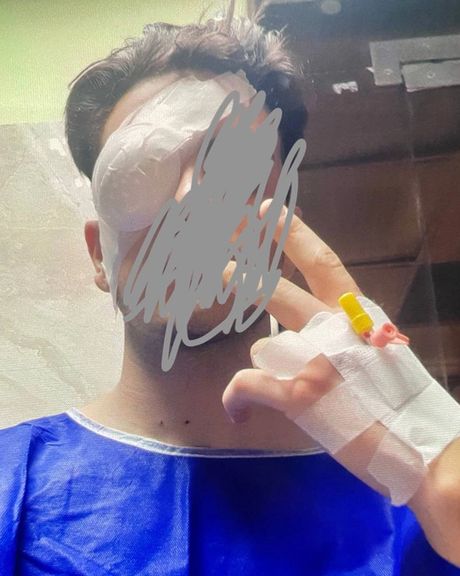
Dozens of ophthalmologists have warned against the use of shotgun ‘birdshots’ and other projectiles by Iran’s security forces that have blinded over 500 protesters since mid-September.
In a letter issued on Friday, a group of about 140 ophthalmologists said that a large number of protesters have been taken to medical centers hit by rubber bullets and metal pellets as well as paintball bullets in their eyes, leading to the loss of eyesight in one or both eyes.
Last week, another group of 230 ophthalmologists issued a similar letter warning about the loss of eyesight among protesters.
The Islamic Republic, which had been previously condemned for blinding protesters in the streets and has intensified the use of guns, including military weapons against unarmed protesters.

In an article on November 19, The New York Times cited ophthalmologists of three hospitals in the capital Tehran – namely Farabi, Rasoul Akram and Labbafinezhad -- and several doctors in Kordestan province, as saying that about 580 protesters suffered serious eye injuries during the regime’s crackdown.
The full scope of mass eye injuries has been largely concealed due to the internet blackout, but medical evidence given to The Times by doctors, protesters, family members of patients and rights groups revealed that ophthalmology wards in hospitals have been overwhelmed with eye injury victims. The range of injuries included mutilated retinas, severed optic nerves and punctured irises.
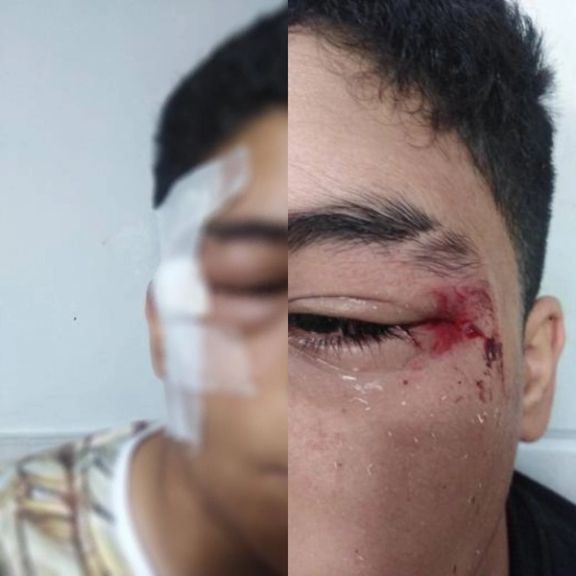
The regime’s security forces have been extensively using cartridges of shotshell loaded with numerous small balls or birdshots, or medium-sized buckshots as well as single large solid projectiles known as a slug to quash the protests across the country.
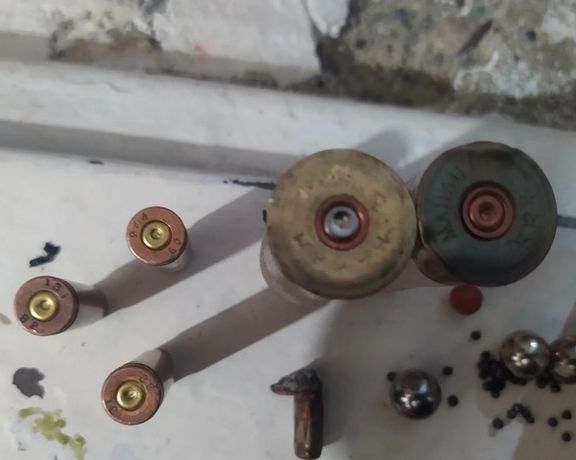
In an investigative report published on Friday, FRANCE 24 found evidence that shotgun cartridges manufactured by French-Italian manufacturer Cheddite have been widely used against Iranian protesters, an apparent violation of EU sanctions that went into place in 2012.
The team analyzed more than 100 photos and videos showing teargas canisters, rifle bullets, paintball projectiles and cartridges from shotguns. While most of the shotgun shells photographed were made in Iran, 13 shells recovered from eight different Iranian cities bore Cheddite logos from factories in Italy and France. The company claims to be the world’s largest maker of empty shotgun cartridges and firing caps, producing more than a billion empty cartridges every year.
Nicholas Marsh, a senior researcher at the Peace Research Institute Oslo (PRIO), told FRANCE 24 about Iran that "The regulation currently in force states that it is not allowed to sell shotguns of any type, ammunition designed for them and associated components. The restriction on firearms was added in an amendment on 24 March 2012. Since then, shotguns and their ammunition have been covered by the EU sanctions, and the sanctions are still in effect." The agency also quoted Amnesty International's researcher on arms control and human rights, Patrick Wilcken, as saying that “Cheddite has a responsibility to respect human rights; it should carry out human rights due diligence on its entire value chain and should cease supplies if there is a risk of goods being diverted into hands of serial human rights violators…”
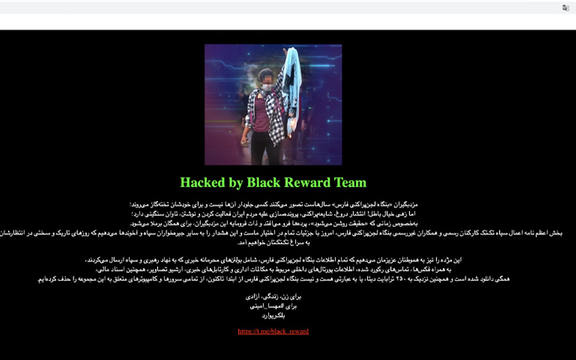
A video showing a journalist at Iran’s hardline Fars News Agency who is apparently masturbating at the agency’s office has gone viral on Iranian social media.
Alleged security camera footage leaked by hackers who targeted the IRGC-affiliated Fars News Agency shows one of its employees in a compromising situation at work.
The group hacked the twitter account of Habib Torkashvand, one of the news agency’s managers and published the video on his account, captioning, “These are the freeloaders of Fars! At the beginning of every week, after coming to the office, they must check who has been at their desk the day before and jerked off!”
The agency has denied that the footage belongs to Fars News, however some users on Twitter have identified the person as one of the economic editors of the website.
The video shows the journo locking the door and then taking off his pants before playing a video to watch and masturbate.
His smoking and having potato chips while enjoying himself has become a fun topic for Iranian users on social media.
Since its creation, hardline Fars News has played a key role in promoting IRGC propaganda and waging psychological warfare against regime opponents.
The hacktivist group Black Reward announced on Friday [Nov. 25] that it had attacked the database of Fars News Agency claiming that it has deleted nearly 250 terabytes of data from all the servers and computers of the website.
Black Reward also said it has obtained the confidential bulletins and directives sent by the news agency to the office of Supreme Leader Ali Khamenei.
Based on the group’s statement, the hacked data includes all recorded calls, information on internal portals related to administrative conversations and news folders, image archives and financial documents of this news agency.
However, Fars says during the recent attack, hackers were only able to destroy the information and news from Friday, and other information and databases of the news agency were not hacked.
Various groups of anonymous hackers have targeted Iran’s government entities in recent years, publishing some confidential information or disrupting the state television’s programs and playing their own messages.
Back in October, Black Reward published a throve of documents from Iran’s nuclear program, after a 24-hour deadline it had given the government expired.
The group said it had hacked the email system of Iran’s Nuclear Power Production and Development company threatening that it will release the documents if the government did not stop its clampdown on protesters. It also said that a total of 50 GB data was obtained.
In the past weeks, Black Reward also hacked the e-mails of managers and employees of Press TV state channel, obtaining their personal information.
The hacker group, which says it is “part of the Iranian hacker community” and works “to confront the criminal clerical regime,” asked Press TV journalists to “be the voice of the people.”
Press TV claims it is the “voice of the voiceless” but it has recently been sanctioned by the European Union for “human rights violations.”
Black Reward had also hacked the emails of the employees of Al-Zahra University in Tehran and the Legal Medicine Organization of the country asking them to support the protesters.
After the start of anti-regime protests in mid-September, Black Reward, together with the hacker group called Tepandegan, sent millions of texts inviting people to participate in protest rallies.
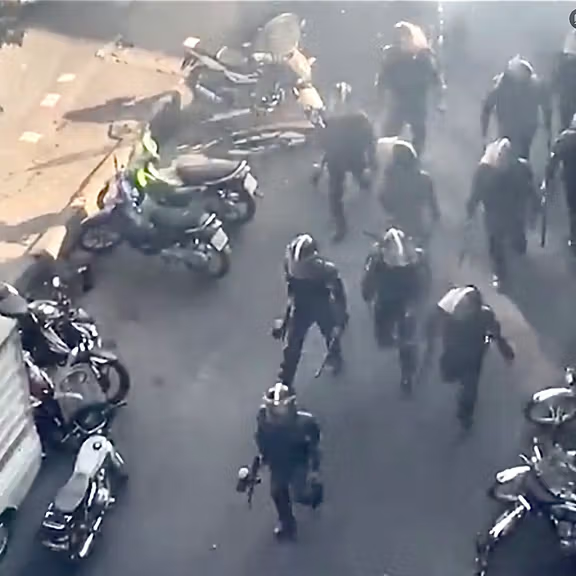
Iranian human rights activists monitoring the situation say the number of people killed in nationwide protests has risen to at least 448 as of Friday, November 25.
The US-based Human Rights Activists News Agency (HRANA) announced in its latest report that from September 16 until Friday, November 25, at least 448 protestors have been killed, of which 63 were minors.
While the Islamic Republic has not provided accurate figures of those detained in the protests, the watchdog went on to say that at least 18,170 protesters have been arrested including 565 students.
HRANA added that156 cities and more than 140 universities across Iran have also been the scenes of anti-government protests.
The group added that 3,234 of the arrested protesters have been identified, saying that 110 are minors.
Meanwhile, “Kurdistan Human Rights Network”, which is a France-based independent organization said at least 104 Kurdish citizens were killed in nationwide protests until Friday, November 25.
The United Nations Human Rights Council on Thursday adopted a resolution based on which an international panel will be formed to investigate the violence against protesters in Iran.
The members of the fact-finding panel will be appointed by the President of the United Nations Human Rights Council, and its mission is to investigate human rights violations since the beginning of Iran's nationwide protests and document the role of its perpetrators.
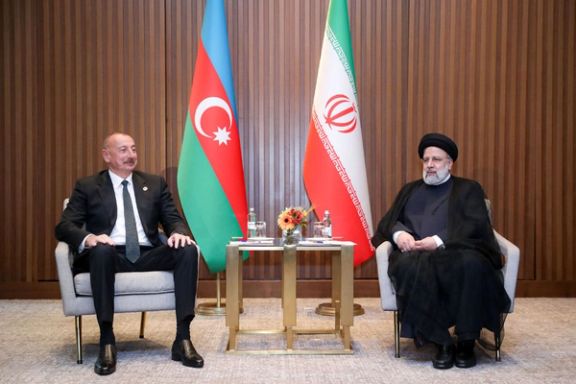
Iran is dangerously implicated in regional tensions centered on Azerbaijan-Armenia that are exacerbated by fall-out from Russia’s war in Ukraine.
Citing Interfax Friday, Iran’s semi-official news agency ISNA reported that Azerbaijan’s President Iham Aliyev cancelled a December 7 meeting in Brussels with Armenian Prime Minister Nikol Pashinyan aimed at easing tensions after September-October clashes killed around 200 Armenian and 80 Azerbaijani soldiers.
Earlier Friday, at a Baku conference ‘Along the Middle Corridor,’ Aliyev launched a broadside against Iran, his toughest so far since relations soured over Iran’s role in the 2020 Azerbaijan-Armenia war, when adjacent Iranian military exercises followed the Azerbaijanis capturing areas around the disputed Nagorno-Karabagh enclave and along the Iran border.
Stepping Friday on ground he previously avoided, Aliyev said his government would do “our best to preserve our secular lifestyle…as well as Azerbaijanis living in Iran,” whom he called “part of our people.” The president said that in Azerbaijan 340 schools taught in Russian and ten in Georgian, while none in Iran taught in Azeri. Around a quarter of Iran’s population is Azari, with analysts and activists disagreeing over the closeness of their cultural-linguistic links to their neighbors to the north.
“We worked with three presidents of Iran, [Mohammad] Khatami, [Mahmoud] Ahmadinejad, and [Hassan] Rouhani,” Aliyev said. “For all these years there was no situation similar to the current one. Never has Iran had two military exercises near our borders within a few months. There have never been such hateful and threatening statements against Azerbaijan.”
‘Hateful statements’ referred to warnings from President Ebrahim Raisi and other leaders against any border changes or threats to Iran’s transit route to Armenia, which is vulnerable since 2020 changes. Iran carried out more military drills along the border October, when Foreign Minister Hossein Amir-Abdollahian also visited Yerevan.
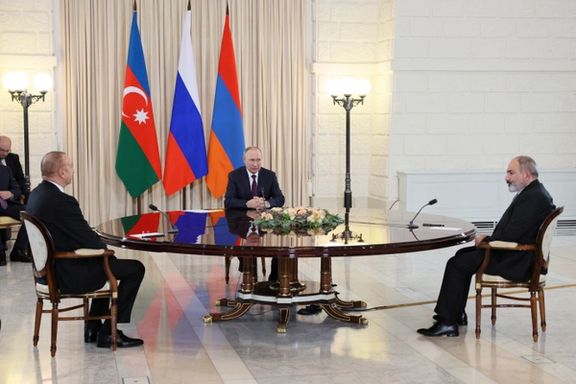
But Tehran-Baku tensions have simmered since the 2020 war, when Iran moderated its past support for mainly Christian Armenia due partly to domestic pressures from both ethnic Azeri and Shia clerics supporting fellow Muslims.
Brussels mediation meeting cancelled?
Armenia’s frustration at what they feel is a lack of support from Russia – which has been engrossed in the Ukraine war – lay behind the news early Friday that Pashinyan had involved French President Emmanuel Macron as a possible mediator to build on the current ceasefire.
This prompted Aliyev’s announcement refusing a French role – and Kremlin spokesperson Dmitry Peskov to immediately offer Moscow’s support as a broker.
Analysts generally see the Azerbaijan-Armenia balance tilting in Baku’s favor since 2020. This has come with Aliyev making statements seen as provocative in Tehran. On November 11, at a summit of Turkic states of central Asia, the president said the “geographical borders of the Turkic world are wider than the Turkic states.” In Baku, state media has recently referred to north-western Iran, where most Iranian Azari live, as ‘south Azerbaijan.’
‘Persian fascist mullah regime’
Mahmudali Chehregani, Washington-based leader of the South Azerbaijan National Awakening Movement, appeared on Azerbaijani state television November 4 to promise the end of the “Persian fascist mullah regime.” Once considered persona not grata in Baku, Chehregani has lately criticized relations between Tehran and Yerevan, the “enemy of Azerbaijanis,” and said that an Armenian consulate due in Tabriz would be “razed to the ground.”
Iran’s options are limited. In mid-November, it summoned ambassador Ali Alizadeh over “unfriendly statements” by leading Baku officials, referring for example to Aliyev November 8 warning Iran, indirectly, against further military exercises.
While Iran’s main concern is fragile land corridor to Armenia – and fears a move to connect Turkey with mainland Azerbaijan and on to central Asia – it may also see Aliyev as exploiting protests in Iran. Such edginess might explain an Iranian suggestion of Azerbaijani involvement in the October 26 attack in Shiraz claimed by the Islamic State group (Isis-Daesh).
Raisi is unlikely, as yet, to take the advice from some commentators, including Shargh newspaper November 12, to downgrade relations with Baku or introduce trade sanctions. But Iran’s recent targeting of Iranian Kurdish groups in northern Iraq may be in part a message to Baku.
Ceyhun Sadlinski at a conference organized by Azerbaijan’s Security Council, where he is first deputy chairman, said Thursday Iran’s “special services are actively carrying out intelligence and subversive activities” against Baku, the official Azerbaijani Press Agency reported. “Drastic measures” were being taken in response, Sadlinski said.
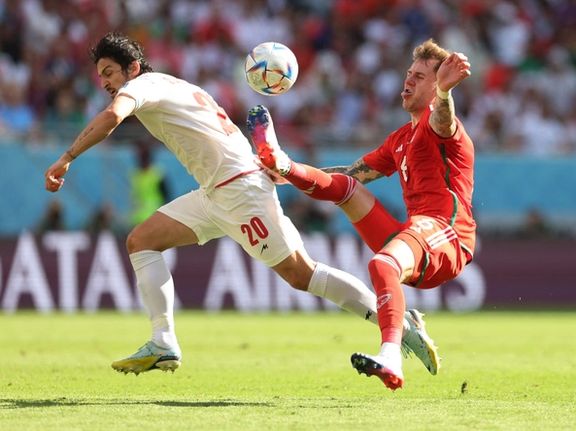
Iran's national soccer team sang during the playing of the Islamic Republic anthem at their second World Cup match against Wales on Friday, barely moving their lips.
They had refused to sing the anthem in their opening game earlier this week in apparent support of protesters back home.
Loud jeers were heard from Iranian supporters as the anthem played, with the team singing quietly as it played. Iranian authorities have responded with deadly force to suppress protests that have marked one of the boldest challenges to its clerical rulers since the 1979 Islamic revolution.
Authorities in Tehran arrested a popular footballer Vorya Ghafouri on Thursday for his outspoken support for protesters.
The national team, called Team Melli has become controversial amid popular anti-regime protests, not siding with protesters who have defied the clerical rulers since September.
Iranians love soccer but not their team anymore as it keeps distancing itself from solidarity with the current wave of protests across the country.
The unsympathetic postureby Team Melli comes on the backdrop of several Iranian sportsmen and women using international competitions to show their support for the protests.
Numerous Iranian athletes have shown support for the protests. The Iranian football, beach football, water polo, basketball, and sitting volleyball teams refused to sing along with the anthem, which is customary in almost all international competitions. Authorities have made serious threats against athletes and other celebrities to stop them from public displays of solidarity with protesters but to no avail.